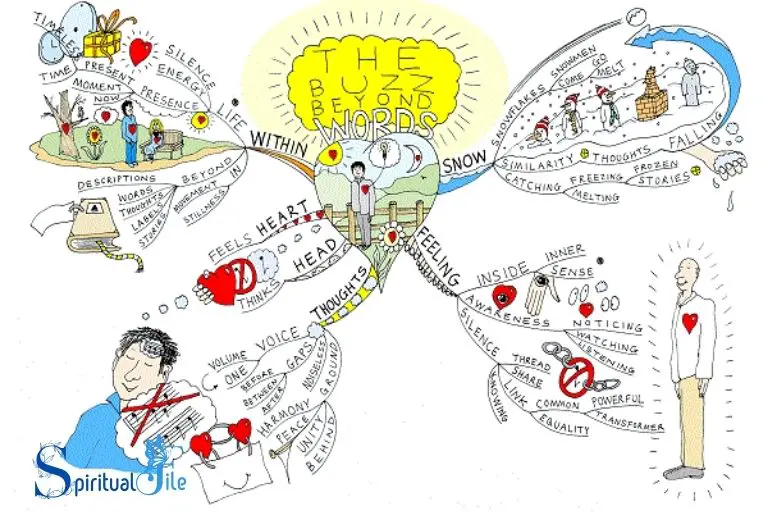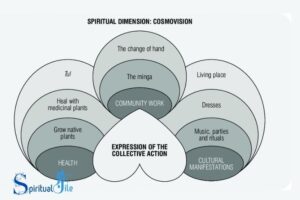Spiritual Life Map Example: A Guide!
A Spiritual Life Map is a visual representation of your spiritual journey. It includes key life events, experiences, and people that have influenced your spiritual growth and development.
Creating a Spiritual Life Map is incredibly personal and introspective. It’s not just about mapping out moments; it’s about understanding our deepest selves by visually representing our spiritual evolution.
This process encourages us to reflect on the impact of each event or person on our lives. The result is a powerful tool for self-awareness and growth, helping us identify where we are now spiritually and showing us potential paths forward in our ongoing spiritual journey.
6 Life Stages: Spiritual Life Map Examples
| Life Stages | Spiritual Growth | Challenges | Key Lessons |
|---|---|---|---|
| Childhood | Learning basic values and principles | Understanding the concept of right and wrong | Learning empathy, kindness, honesty |
| Adolescence | Deepening understanding and personalizing beliefs | Balancing spiritual beliefs with societal pressures | Developing personal integrity, resilience |
| Young Adulthood | Exploring and questioning beliefs, seeking purpose | Defining personal spirituality despite external influences | Self-discovery, open-mindedness, purpose recognition |
| Midlife | Further refining and affirming spiritual beliefs | Integrating spirituality into the complexity of daily life | Achieving balance, mindfulness, spiritual maturity |
| Older Adulthood | Reflecting on spiritual journey, life purpose | Dealing with life losses in the light of spirituality | Acceptance, wisdom, legacy |
| Late Life | Summing up life’s spiritual journey | Facing end of life with spiritual peace | Life review, peace, transcendence |

What Is A Spiritual Life Map?
A spiritual life map is a visual representation of a person’s spiritual journey and growth. It provides guidance, inspiration, and direction on one’s path to self-discovery, enlightenment, and connection to a higher power.
An example of a spiritual life map can include milestones, goals, practices, and experiences that shape an individual’s spiritual development.
When it comes to navigating the realm of spirituality, having a clear roadmap can be incredibly helpful. Enter the spiritual life map, a personal tool that aims to provide guidance and structure on your spiritual journey.
This dynamic map serves as a visual representation of your aspirations, goals, and progress, helping you stay focused and intentional as you explore the depths of your spiritual self.
Definition And Purpose Of A Spiritual Life Map:
A spiritual life map can be defined as a compass that aligns your thoughts, experiences, and actions with your spiritual aspirations.
It serves as a visual reminder of your purpose and a navigational aid as you delve deeper into your spiritual growth.
The primary purpose of a spiritual life map is to:
Provide clarity: By mapping out your spiritual goals and intentions, a spiritual life map brings clarity to your path, helping you gain a better understanding of yourself and your purpose.
Set milestones: Just like any journey, the spiritual path has milestones. A spiritual life map allows you to identify and track these milestones, giving you a sense of accomplishment and progress along the way.
Foster self-reflection: A spiritual life map encourages regular self-reflection, allowing you to pause and evaluate your spiritual journey. Through introspection, you can make conscious adjustments, deepen your understanding, and learn from your experiences.
Inspire motivation: As you visualize your spiritual goals and dreams on your spiritual life map, it ignites a sense of motivation and inspiration. This visual representation serves as a powerful tool to keep you motivated and dedicated to your spiritual growth.
Cultivate manifestation: The manifestation of intentions plays a vital role in spiritual practices.
By creating a spiritual life map, you are actively taking part in the process of manifesting your desires. Visualizing your aspirations can bring them one step closer to reality.
Now that we have a clear understanding of what a spiritual life map entails, let’s explore the practical implementation and benefits of creating one.
Assessing Your Current State
Assessing your current spirituality is crucial for creating a spiritual life map. By evaluating your beliefs, values, and practices, you can create a personalized example that guides your spiritual journey and growth.
Spiritual Life Map Example
Have you ever wondered where you stand in your spiritual journey? Assessing your current state is an essential step towards personal growth and self-awareness.
By reflecting on your current spiritual practices and beliefs, as well as identifying areas for growth and improvement, you can navigate your spiritual life more intentionally.
Let’s explore how to assess your current state in this spiritual life map example.
Reflection On Current Spiritual Practices And Beliefs:
- Take time to examine your existing spiritual practices and beliefs to gain insights into their effectiveness and alignment with your values.
- Reflect on how often and consistently you engage in spiritual practices, such as meditation, prayer, or attending religious services.
- Consider the impact of these practices on your daily life and overall sense of well-being.
- Evaluate the depth of your spiritual beliefs and their influence on your thoughts, choices, and relationships.
Identifying Areas For Growth And Improvement:
- Acknowledge areas in your spiritual life that may require growth and improvement.
- Identify any inconsistencies between your beliefs and your actions.
- Explore new spiritual practices that resonate with you and align with your values.
- Seek guidance from trusted mentors, spiritual leaders, or resources to support your growth.
- Be open to challenging and expanding your existing beliefs, allowing room for growth and evolution.
Assessing your current state is an ongoing process that requires self-reflection, honesty, and a willingness to change.
Embrace this opportunity to deepen your spiritual journey and chart a course for personal transformation. Remember, understanding where you are now is the first step towards reaching where you want to be in your spiritual life.
Now that you have a clearer understanding of how to assess your current state, let’s move on to the next step: creating a vision for your spiritual life.
Setting Spiritual Goals
Embarking on a spiritual journey requires setting meaningful goals. Creating a spiritual life map is an excellent example of mapping out personal growth and development in the realm of spirituality.
Spirituality is a journey that can bring profound meaning and fulfillment to our lives. Just like any other journey, it’s helpful to have a map to guide us along the way.
A spiritual life map can serve as a compass, helping us navigate the ups and downs and stay on track to our desired destination.
The Importance Of Setting Specific And Measurable Goals:
Setting spiritual goals provides clarity and direction: Goals help us define what we want to achieve in our spiritual journey. They give us a sense of purpose and focus, guiding our actions and decisions.
Specific and measurable goals allow for progress tracking: When we set specific goals, we can easily track our progress and see how far we’ve come. This sense of accomplishment and growth can be highly motivating and encouraging.
Goals help us stay committed and disciplined: In the absence of goals, it’s easy to become disconnected or lose motivation in our spiritual practice.
Setting specific and measurable goals helps us stay committed and disciplined, ensuring we continue to invest time and effort into our spiritual journey.
Examples Of Spiritual Goals To Consider:
Daily meditation practice: Committing to a daily meditation practice can help cultivate a sense of inner peace, mindfulness, and self-awareness. It can also enhance our connection with the divine and deepen our spiritual experience.
Developing a gratitude practice: Cultivating gratitude in our lives can bring about a shift in perspective and help us appreciate the blessings and abundance around us. Setting a goal to practice gratitude daily or regularly can foster a deeper sense of contentment and joy.
Engaging in acts of service: Setting a goal to engage in acts of service or volunteer work allows us to extend our compassion and kindness to others. This can not only benefit those we serve but can also deepen our understanding of empathy and interconnectedness.
Studying spiritual texts: Setting a goal to study spiritual texts, such as sacred scriptures or philosophical teachings, can provide a deeper understanding of spiritual principles and wisdom. This can enhance our spiritual growth and insights.
Connecting with a spiritual community: Setting a goal to actively participate in a spiritual community can provide support, guidance, and opportunities for growth.
Being part of a community can foster connections, provide a space for learning, and inspire us in our spiritual journey.
Remember, setting spiritual goals is a personal and individual process. It’s important to choose goals that resonate with your values, aspirations, and spiritual path.
Reflect on what areas of your spirituality you’d like to nurture and grow, and set specific and measurable goals that align with your intentions.
Embrace your spiritual life map as a tool to guide you and celebrate the progress you make along the way.
Developing A Plan Of Action
Develop your spiritual life map with a plan of action that guides your personal growth and fulfillment.
Navigate your spiritual journey with intention and purpose, mapping out key milestones and steps to help you stay focused and aligned with your spiritual goals.
Creating a plan of action is essential when it comes to developing your spiritual life. It provides structure and guidance, helping you stay focused and committed to your spiritual practices and habits.
Below are some strategies for implementing spiritual practices and habits, as well as creating a schedule and accountability system:
Strategies For Implementing Spiritual Practices And Habits:
- Start your day with a mindfulness practice: Begin each day by setting aside a few moments for quiet reflection or meditation. This helps to center your mind and establish a state of calm before you embark on your daily activities.
- Incorporate gratitude into your routine: Take time each day to express gratitude for the blessings in your life, whether through journaling, affirmations, or simply counting your blessings. This practice cultivates a positive mindset and enhances your overall well-being.
- Engage in regular prayer or affirmations: Set aside dedicated time for prayer or affirmations, depending on your spiritual beliefs. This practice deepens your connection with the divine and reinforces your spiritual values.
- Seek spiritual guidance and learning: Explore different resources such as books, podcasts, or workshops that align with your spiritual interests. Continual learning and seeking guidance can provide valuable insights and support your spiritual growth.
Creating A Schedule And Accountability System:
Set specific goals: Define what you want to achieve in your spiritual life, whether it’s developing a daily meditation practice, reading spiritual texts, or volunteering. Set clear, achievable goals that align with your priorities.
Establish a regular routine: Create a schedule that incorporates your spiritual practices and habits into your daily life. Set specific times for meditation, prayer, reading, or any other spiritual activities. Consistency is key to nurturing your spiritual life.
Find an accountability partner: Consider partnering with someone who shares similar spiritual aspirations. Regularly check in with each other, share progress, and provide encouragement and support.
This accountability system can help both parties stay committed and motivated.
Utilize technology: Use smartphone apps or online calendars to set reminders for your spiritual practices. This can help you stay on track even on busy days when it may be tempting to skip your spiritual routine.
Reflect and adjust as needed: Regularly assess your progress and make adjustments to your plan of action as necessary.
Note what is working well and what could be improved. This self-reflection ensures you stay engaged and continuously evolve in your spiritual journey.
Remember, developing a plan of action is only one part of the equation. It is equally important to approach your spiritual practices and habits with an open and compassionate mindset. Embrace the journey, be kind to yourself, and allow room for growth and transformation.
Overcoming Doubt And Uncertainty
Embark on a spiritual life map journey to conquer doubt and uncertainty. Navigate through challenges and embrace inner clarity to live a purposeful and fulfilling life.
Ways To Address And Overcome Doubts And Questioning
Feeling unsure or uncertain about your spiritual journey is completely normal. Doubt and questioning are natural parts of the process, and they can actually deepen your understanding and strengthen your faith.
Here are some effective ways to address and overcome doubts and questioning:
Seek guidance and support from mentors or spiritual leaders: Often, turning to someone with more experience and knowledge can provide valuable insights and reassurance.
Whether it’s a trusted mentor or a spiritual leader in your community, they can offer guidance and help you navigate through your doubts.
Engage in self-reflection and introspection: Take the time to explore your thoughts and emotions. Journaling, meditation, or simply finding a quiet space for introspection can help you gain clarity and understand the root of your doubts.
Educate yourself: Learning more about your spiritual beliefs and practices can help you address any uncertainties. Read books, attend workshops, or take courses that delve into the teachings and philosophies that resonate with you.
Embrace critical thinking: Doubts can be opportunities for growth and deeper understanding. Engage in critical thinking by questioning your beliefs and seeking evidence and reasoning. This analytical approach can help you find answers and strengthen your faith.
Connect with a supportive community: Surrounding yourself with like-minded individuals who share your spiritual beliefs can provide a sense of belonging and support.
Participate in religious or spiritual gatherings, join online communities, or attend retreats to connect with others on a similar path.
Emphasize personal experiences: Reflect on moments when you felt connected to something greater than yourself. Focus on your personal experiences of spirituality, miracles, or divine intervention. These moments can serve as anchors during times of doubt.
Practice mindfulness: Incorporate mindfulness techniques into your daily routine. By living in the present moment and cultivating awareness, you can find solace and grounding amid doubts and uncertainties.
Embrace the ebb and flow of faith: Understand that faith is not a static entity but rather a journey that evolves over time. Embracing the ebb and flow of your faith can help you navigate through doubts and find renewed conviction.
Engage in meaningful conversations: Engaging in open and honest conversations about doubts and questioning with trusted friends, family, or spiritual leaders can provide different perspectives and insights.
Sharing your journey with others can create a sense of support and understanding.
Trust the process: Remember that doubt is a natural part of spiritual growth. Trusting the process and being patient with yourself allows for the exploration and transformation necessary to overcome uncertainties.
By implementing these strategies and approaches, you can address doubts and questioning on your spiritual life map and move forward with renewed strength and conviction in your spiritual journey.
Dealing With Distractions And Temptations
Keep your focus on your spiritual journey by creating a clear life map. By identifying distractions and temptations, you can navigate your path and stay true to your spiritual goals. Stay mindful and committed to your journey.
Distractions and temptations are inevitable in our daily lives, often leading us astray from our spiritual journey. However, with the right mindset and strategies, we can effectively manage external influences that may divert us from our path of spiritual growth.
By cultivating mindfulness and focus, we can strengthen our spiritual connection and stay grounded amidst the chaos of everyday life.
Managing External Influences That May Divert From Spiritual Growth:
- Identify negative influences: Recognize the external factors that tend to distract and tempt you away from your spiritual practices.
- Create boundaries: Set clear boundaries to protect your spiritual well-being. This may involve limiting exposure to certain people, situations, or media sources that have a negative impact on your spiritual growth.
- Surround yourself with positivity: Surround yourself with like-minded individuals who support and encourage your spiritual journey. Seek out positive influences that inspire and uplift you.
- Practice self-discipline: Develop self-discipline to resist temptations that hinder your spiritual progress. This may involve refraining from engaging in unhealthy habits or indulging in behaviors that are contrary to your spiritual beliefs.
- Seek guidance and support: Reach out to spiritual mentors, teachers, or communities that can provide guidance and support in navigating distractions and temptations. Surrounding yourself with a supportive network can help you stay grounded and focused.
Cultivating Mindfulness And Focus In Daily Life:
Practice meditation: Set aside dedicated time each day for meditation to quieten the mind and cultivate mindfulness. Regular meditation helps develop focus and awareness, allowing you to better navigate distractions.
Engage in mindful activities: Incorporate mindfulness into your everyday activities by focusing on the present moment. Whether it’s enjoying a meal, walking in nature, or doing household chores, be fully present and engaged in the task at hand.
Limit multitasking: Avoid multitasking as much as possible, as it can lead to scattered attention and reduced focus. Instead, focus on one task at a time, giving it your full attention and dedication.
Eliminate unnecessary distractions: Minimize external distractions by creating a conducive environment for spiritual growth.
This may involve decluttering your physical space, turning off notifications on your devices, or establishing a designated space for spiritual practices.
Practice self-awareness: Cultivate self-awareness by regularly reflecting on your thoughts, emotions, and behaviors.
This introspective practice allows you to identify patterns and habits that may hinder your focus and make conscious choices to redirect your attention towards your spiritual goals.
By applying these strategies, we can effectively deal with distractions and temptations in our spiritual journey.
Remember, it’s a continual process that requires commitment and effort, but the rewards are immeasurable. Stay focused, stay mindful, and let your spiritual life map guide you towards growth and fulfillment.
Addressing Failure And Maintaining Resilience
Maintaining resilience in the face of failure is essential for navigating the spiritual life map. By embracing setbacks as opportunities for growth, individuals can cultivate inner strength and find new paths to fulfillment.
Embracing Failure As Part Of The Growth Process
Failure is often seen as a negative experience, something to be avoided at all costs. However, when it comes to our spiritual journey, failure can be a powerful teacher and a catalyst for growth.
Embracing failure means understanding that it is an inevitable part of life and using it as an opportunity for learning and self-improvement.
Here are some key points to keep in mind when it comes to embracing failure as part of the growth process:
Shift your perspective: Instead of viewing failure as a setback, see it as a stepping stone towards success. Understand that every failure brings with it valuable lessons and insights that can help you move forward on your spiritual path.
Learn from your mistakes: Take the time to reflect on your failures and identify the lessons they offer. What could you have done differently? What did you learn about yourself? Use these insights to make better choices and avoid repeating the same mistakes in the future.
Give yourself permission to fail: Fear of failure can hold you back from taking risks and fully embracing your spiritual journey.
Give yourself permission to make mistakes and be imperfect. Remember that failure is not a reflection of your worth or abilities, but simply an opportunity for growth.
Cultivate resilience: Building resilience is essential in bouncing back from failure. Resilience allows you to navigate setbacks with grace and determination, rather than getting derailed by them.
Here are some ways to build resilience:
Building Resilience And Bouncing Back From Setbacks
Building resilience is a vital skill to cultivate on your spiritual journey. The ability to bounce back from setbacks allows you to stay focused, motivated, and committed to your path.
Here are some strategies to help you build resilience:
- Cultivate self-awareness: Understand your own strengths and weaknesses, as well as your triggers and vulnerabilities. This self-awareness will help you better handle challenges and setbacks when they arise.
- Develop a growth mindset: Embrace the belief that failure is not a reflection of your abilities, but rather an opportunity for growth and learning. This mindset shift allows you to approach setbacks with curiosity and a willingness to learn from them.
- Practice self-care: Taking care of your physical, emotional, and mental well-being is essential in building resilience. Make sure to prioritize self-care activities such as exercise, meditation, spending time in nature, and connecting with loved ones.
- Seek support: Surround yourself with a supportive community of like-minded individuals who can offer guidance, encouragement, and perspective during challenging times. Having a strong support network can help you stay resilient and motivated on your spiritual journey.
- Stay committed to your values: Remind yourself of your core values and the reasons why you embarked on this spiritual path. Staying true to your values will give you the strength and motivation to persevere, even in the face of failure.
Remember, failure is not the end but rather a stepping stone towards growth and self-discovery. Embrace failure as a teacher and view setbacks as opportunities to learn and strengthen your resilience.
By doing so, you will navigate your spiritual journey with grace, determination, and an unwavering commitment to your path.
Regular Evaluation And Reflection
Looking to evaluate and reflect on your spiritual journey? Check out this spiritual life map example that provides a guide for regular assessment and self-reflection to enhance your spiritual growth and well-being.
The Importance Of Reviewing Progress And Checking Alignment With Goals:
Regular evaluation and reflection play a vital role in our spiritual journey, allowing us to assess our progress and ensure alignment with our goals.
By regularly reviewing our actions, experiences, and lessons learned, we can gain valuable insights and make necessary adjustments to continue growing spiritually.
Here are some key reasons why regular evaluation and reflection are important:
Provides clarity and direction: When we take the time to evaluate our spiritual progress, we gain clarity about what is working well and what needs improvement. This, in turn, helps us stay focused and aligned with our goals.
Identifies areas for growth: Reflection allows us to recognize areas in our spiritual life that require further development. By acknowledging these areas, we can take deliberate steps to foster growth and overcome any obstacles along the way.
Celebrates achievements and milestones: Regular evaluation gives us the opportunity to celebrate our achievements and milestones.
By acknowledging our progress and expressing gratitude for how far we’ve come, we can cultivate a positive mindset and nourish our spiritual well-being.
Guides decision-making: Assessment and reflection help us make informed decisions about our path forward. By understanding what has worked in the past and what hasn’t, we can make better choices that align with our spiritual aspirations.
Reflecting on spiritual experiences and lessons learned:
As part of our regular evaluation and reflection, it is essential to reflect on our spiritual experiences and lessons learned.
This practice allows us to dive deeper into the meaning behind our encounters and extract valuable insights that can guide our growth and transformation.
Here’s why reflecting on spiritual experiences is important:
- Deepens understanding: By reflecting on our spiritual experiences, we can gain a deeper understanding of their significance and the impact they have had on our spiritual journey. This deeper understanding opens doors to new insights and perspectives.
- Integrates lessons: Reflection helps us integrate the lessons learned from our spiritual experiences into our daily lives. By consciously connecting these lessons to our thoughts, actions, and interactions, we can embody the wisdom gained through our experiences.
- Enhances self-awareness: Regular reflection allows us to develop a heightened sense of self-awareness. By observing our thoughts, emotions, and reactions during different spiritual experiences, we can gain valuable insights into our true selves.
- Strengthens spiritual connection: When we reflect on our spiritual experiences, we forge a stronger connection with our higher self or the divine. This connection deepens our spiritual practice and fosters a sense of unity and peace within.
Remember, regular evaluation and reflection are essential components of our spiritual life map. By making them a consistent practice, we can navigate our spiritual journey with greater clarity, purpose, and growth.
Making Adjustments And Course Corrections
Learn how to make adjustments and course corrections in your spiritual life with this practical example of a spiritual life map.
Discover the steps to stay on track and navigate spiritual challenges effectively. Use this map to guide your journey towards spiritual growth and fulfillment.
In our spiritual journey, it is normal to encounter moments that require us to pivot and adapt our plans. Life is ever-changing, and our spiritual growth is no exception. Flexibility and openness to change are essential as we navigate the twists and turns of our path.
Here are some insights on how to pivot and adapt your plan when necessary:
How To Pivot And Adapt Your Plan When Necessary
Embrace self-reflection: Regularly assess your spiritual goals and practices to determine if they still resonate with your current needs and aspirations. Take time to reflect on the areas of your life that may require adjustment or course correction.
Listen to your intuition: Trust your inner voice and pay attention to the subtle nudges from the universe. Your intuition often provides guidance on when it’s time to make a change or shift your focus. Tune in and listen to the whispers of your soul.
Seek guidance and support: Reach out to spiritual mentors, teachers, or like-minded individuals who can offer guidance and support during times of adjustment. Surround yourself with a community that understands the importance of growth and transformation.
Stay open-minded: Be willing to let go of rigid plans and expectations. Stay open to new possibilities and insights that may arise throughout your spiritual journey. Flexibility allows for greater expansion and personal evolution.
Adapt your practices: Explore different spiritual practices and teachings that align with your evolving beliefs and values. Be open to incorporating new rituals, meditations, or ceremonies into your daily life. Experimentation can lead to profound discoveries.
Learn from setbacks: View setbacks or perceived failures as opportunities for growth rather than obstacles.
Embrace the lessons embedded within challenges and use them as stepping stones towards a more refined spiritual path. Allow setbacks to be catalysts for positive change.
Stay connected with yourself: Regularly check in with yourself and your inner guidance. Cultivate mindfulness and create daily moments of stillness to listen to your authentic self.
This connection will help you navigate the necessary adjustments on your spiritual path.
Practice self-compassion: Be gentle and patient with yourself as you make adjustments and course corrections.
Remember that your spiritual journey is uniquely yours, and it can unfold at its own pace. Celebrate progress, no matter how small, and acknowledge the effort you put into your personal growth.
Summary
Flexibility and openness to change are vital when navigating our spiritual journey.
By embracing self-reflection, trusting your intuition, seeking guidance and support, staying open-minded, adapting your practices, learning from setbacks, staying connected with yourself.
Practicing self-compassion, you can gracefully make adjustments and course corrections along your spiritual life map. Remember, it’s the journey itself that shapes and transforms us.
Can a Spiritual Journal Help Create a Personalized Spiritual Life Map?
Keeping spiritual journal reflections personal can be a powerful tool in creating a personalized spiritual life map. By recording thoughts, prayers, and experiences, individuals can track their spiritual journey and gain insight into their beliefs and values. This enables greater understanding and growth in their spiritual lives.
Celebrating Growth And Transformation
Embark on a remarkable journey of self-discovery with a spiritual life map example. Celebrate growth and transformation as you navigate through the intricate paths of your spiritual evolution. Experience profound insights and find purpose in your sacred odyssey.
Recognizing Personal Growth And Milestones Achieved:
One of the most rewarding aspects of our spiritual journey is witnessing our personal growth and celebrating the milestones we achieve. It is important to acknowledge and appreciate our progress along the way.
Here are some key ways to recognize personal growth and milestones achieved:
Setting goals and tracking progress:
- Setting clear and specific goals helps us stay focused and motivated on our spiritual path.
- Reflect on your goals and track your progress regularly to see how far you have come.
- Celebrate each milestone you achieve, no matter how small, as they all contribute to your overall growth.
Journaling and self-reflection:
- Keep a journal to document your spiritual journey and reflect on your experiences.
- Write down your thoughts, insights, and lessons learned from various spiritual practices or events.
- Review your journal periodically to recognize patterns, growth, and areas where you have made significant progress.
Gratitude and appreciation:
- Cultivate a sense of gratitude and appreciation for the blessings and lessons that come your way.
- Take the time to acknowledge and express gratitude for the personal growth you have experienced.
- Celebrate the positive changes in your life and the impact your spiritual journey has had on your well-being.
Seeking feedback and support:
- Surround yourself with supportive and like-minded individuals who can offer guidance and feedback.
- Seeking feedback from mentors, spiritual teachers, or trusted friends can help you gain valuable insights into your growth.
- Celebrate the constructive feedback you receive as it signifies opportunities for further transformation.
Acknowledge inner transformation:
- Pay attention to the changes happening within you, such as increased self-awareness, compassion, and mindfulness.
- Celebrate the growth of your inner qualities and how they positively impact your relationships and interactions with others.
- Recognize that true transformation happens from the inside out, and honor the progress you have made on this deep inner level.
To celebrate our spiritual growth and milestones achieved, we must be intentional in recognizing our progress, setting goals, reflecting on our journey, expressing gratitude, seeking support, and acknowledging our inner transformation.
Remember, every step counts, and each milestone is a testament to the transformative power of our spiritual life map.
Conclusion
Creating a spiritual life map is a powerful way to navigate our journey towards enlightenment.
By recognizing our unique purpose, setting intentions, and aligning our actions with our spiritual values, we can cultivate a deeper connection with our higher selves and the universe.
Taking the time to reflect on our desires, beliefs, and aspirations allows us to gain clarity and focus on what truly matters in our lives.
Embracing spiritual practices and seeking guidance from spiritual teachers can provide us with the wisdom and tools we need to stay on track.
It is important to remember that this is a journey, and we must be patient and compassionate with ourselves as we navigate the ups and downs along the way. Each step we take towards spiritual growth brings us closer to a more meaningful and fulfilling life.
So, start your spiritual life mapping today, and embark on a transformative journey of self-discovery and spiritual enlightenment.
May your path be filled with love, joy, and abundance as you explore the depths of your soul and connect with the divine essence within you.





